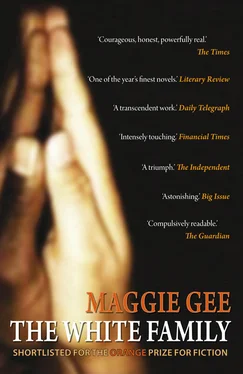Shirley stared after Winston forlornly. She felt she had failed him in some important way. He had asked the family to come to the film; only she had come. And she’d let him down. She watched his elegant narrow head weaving away through the indifferent crowd. His shoulders looked rounded to her, defeated, as if he had lost an important battle. She told herself she was exaggerating. But later she would remember it.
‘I’ll drive you home,’ Thomas said.
‘You frightened him off. He’s a very sweet boy.’
‘I’m sure I didn’t.’ But he looked triumphant. ‘Have you known him long?’
‘Yes. Why?’ She was aware she was snapping.
‘Oh nothing.’
She could see there was something. It has to be jealousy, she thought, and found herself faintly stirred. Thomas was a big man. Clever. Attractive.
She knew she mustn’t think like this. ‘I’m not going home, as a matter of fact. I’m going to the hospital to see Dad.’
‘I’ll drive you there.’
‘I thought I would walk. It’s a lovely day.’
He was visibly relaxing. ‘I actually saw your dad this morning … But I’d like to walk with you, if you don’t mind.’
It was almost as if he wanted to protect her. They walked together to the hospital, talking about the Baldwin film. She warmed to him, finding he had liked it too.
‘I thought he was amazing,’ Thomas said, as they crossed the road, arms touching lightly. ‘That bit when he said to the journalist, after the deaths of Michael X and Martin Luther King, “I have been trying to write, between assassinations.”’
‘Yes. Very witty. But terrible. But what got to me most was the simplest thing. He said something like, “They’re killing my friends, and have been as long as I’ve been alive.”’
‘At least things have never been that bad in England. I watch a film like that, and get all fired up —’ He was waving his hands, and walking faster.
‘That’s to your credit —’ she said, eagerly. (Perhaps that was why he had been rude to Winston. Perhaps he had simply been upset —)
‘— and I realize things are relatively OK here.’
She digested this. ‘Mmm. Well, I was married to an African.’
‘You don’t agree?’
‘Look, it’s complicated.’ But Shirley didn’t want to argue.
So Thomas felt encouraged to go on. ‘At the library, you know, it’s all sorts — West Indian, Asian, Irish, a Swede — and nearly half the staff are black. But we all get on. It’s just not an issue . Apparently the only time we didn’t was the eighties, when the council got terribly p.c. and sent two race relations advisers in. Then everyone started to hate each other. Meanwhile these advisers ruined the stock, chucking out books that had the, quotes, wrong message and spending the earth on, I don’t know, huge glossy books on Portuguese slavery that cost forty quid and never went out … Hundreds of books on racism. But the public doesn’t care about things like that. People aren’t interested, is the bottom line.’
He obviously thought he was being daring. Shirley was used to people doing that, priding themselves on saying the unsayable. Though what they said was often predictable. ‘Are you sure no one’s interested?’ she asked. They were turning in through the gates of the hospital. ‘Surely a lot of the readers are black. Winston for example. My boyfriend’s brother.’
There was a silence. His step checked slightly. ‘Just now? Was that man your boyfriend’s brother ?’
Why did he seem so taken aback? Had he assumed her boyfriend was white? ‘He’s doing a thesis on James Baldwin.’
‘What? … Is he ?’
Thomas looked shell-shocked. Irritated, Shirley expanded.
‘At University College London. Not just on James Baldwin. On another two writers who were friends of his as well.’ She tried to remember. ‘Norman Mailer. He’s American too. And — Eldridge Cleaver. Who turned against Baldwin … He hated white people and, you know, homosexuals. Winston was telling me all about it. I think he’s been taking notes in your library. So some of those books would have come in useful. What’s the matter, Thomas? Your mouth is open.’
He looked briefly like her father remembering a name, slowly, unwillingly, with very great pain, when he needed it, and her mother was out.
Winston walked quickly into the Park. He felt as if skeins of inky water were twisting and turning into one great river that poured, undeniable, through his head. He was exalted; he was cast down; he was electric with conviction, leaden with doubt. The Price of the Ticket — Baldwin paid the price. He would like to speak the truth like him, he would say it, speak it, sing it out — life would be simple, lived in the sunlight (life was detestable! he lived in prison …)
He’d come here regularly when he was thirteen and Elroy had bought him rollerblades. The Park meant ice-creams and heat and shade, under the trees where you lay and got your breath back. He admired his brother, and wanted to be like him.
But around fourteen, the other thing started. The sense that he was not like the others had begun to be stronger and more fixed than his vague yearnings for Elroy’s friends. He could not let himself think what it meant, because what it meant was impossible. He was a normal boy, from a normal family. A normal, God-fearing family. His father was no longer around, of course, but his mother marched them to church every Sunday, and there they stayed for two or three hours, listening to the preachers shouting from the pulpit, hammering at him till his head ached, then the waves of song washing round like balm. Sex meant sin (but he knew it didn’t, because Elroy and all the other big boys went looking for it, talked about it all the time, teased the younger ones about not getting it). Winston joined in with the foolery but he always felt he was missing something.
He fell in love with the new head teacher who came to his primary school when he was in Year 6. Mr Glover was tall and athletic — he demonstrated a sprint start on Sports Day — but best of all, he liked poetry and read them a poem every morning in assembly. When he noticed how gifted Winston was at English, he often asked him to read instead. Then Winston wrote a poem for homework so good that Mr Glover printed it in the School Newsletter. He called Winston’s mother in to see him, but she refused to tell Winston what he had said.
‘No good will come of it. I won’t do it,’ he heard her jabbering to his sisters. ‘The fear of the Lord is the beginning of wisdom.’ How tired Winston got of hearing that phrase.
Later, too late for him to try it, his elder sister let it out that Mr Glover had recommended he try for a scholarship to public school. ‘Mum wasn’t having it. And she right! You don’t want to go to no battyboy school.’
So he didn’t go to a battyboy school. But he still grew up clever. He still grew up different.
Unthinkable, impossible. But true, and real.
There was no one he could tell. He was completely alone. At first he thought that only white men were queer, because his brother said it was a white thing, that only white men were dirty perverts. At school, ‘battyboy’ was the worst insult, but they threw it around with perfect freedom, because they knew none of them was gay.
None of them was gay. So nor could he be.
(He sometimes found himself imagining, insanely, that his father would come home, and he could tell him everything. A father who was young, kind, all-understanding … In real life, Winston had a scanty memory of a tall grizzled man who had once been handsome with an overhanging belly and big gold chains. Elroy had once told him Dad had fifteen children. What would it be like to know your father?)
Читать дальше












